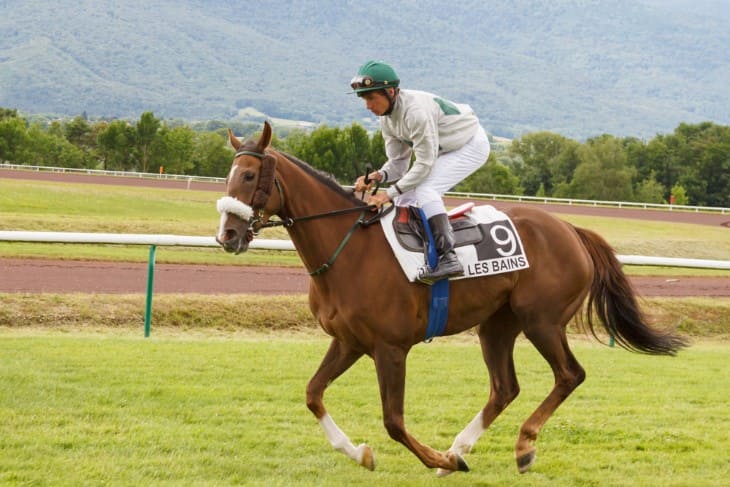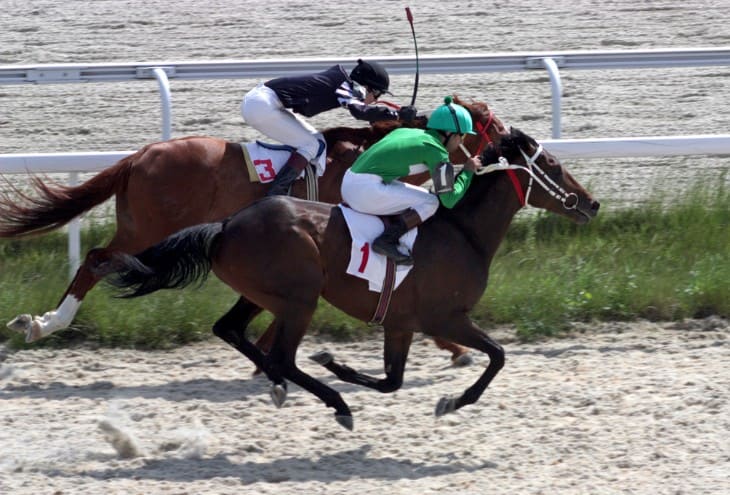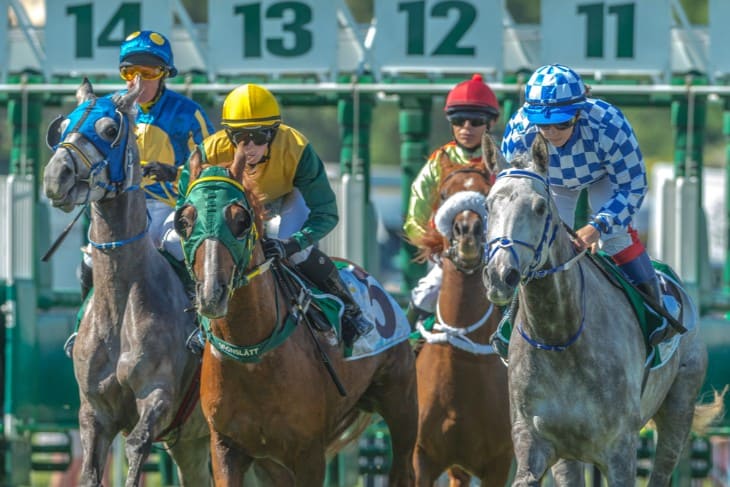Horse racing is a beautiful sport filled with intensity and beauty that attracts millions. While the audience cheers for their favourite horse or puts bets on which one will win, it is often questioned whether or not the horse enjoys the thrill of racing.
This article looks at different aspects of horse racing, from natural behaviours to training methods, to determine if these animals love running races as we do or are simply participating as trained athletes.
Natural Instincts Of Horses
Horses originally had a strong instinct to run, coming from their time in the wild, where running was necessary for survival. They run to escape predators and also for social reasons. Wild horses race each other when they play or just to find out who among them is fastest. This tells us that safety alone does not make them run but is part of what they do daily.
When we observe this running behaviour, horses may be built to enjoy running. This becomes important when considering racing, which is essentially controlled-environmental running. Running is natural among horses; hence, there could be some truth in thinking that many would like to participate in races under the right conditions, too. Not all horses are equal, though; some may have a higher affinity for speed than others, but generally speaking, our understanding should be guided by their inherent desire to 'race'.
This notion comes in handy when training horses for competitions since aligning such exercises with what comes naturally can increase the chances of having fun while doing so and winning more frequently. What they need is fun, so happy horses are fast ones, too.
Role Of Training In Racing
Training is very important when it comes to getting horses ready for the racetrack. It’s more than just making them strong and fast; they need to know what to expect in a race. Trainers spend much of their time with the horses, teaching them commands and getting them used to their routines on race day, which makes them feel prepared and confident.
A large portion of training involves building trust between horse and trainer. In order for the horse to feel safe, trainers should be trusted by horses. When this happens horses are more likely to follow instructions given by their jockey or rider which will lead them towards performing better during races. Also, trainers watch out for signs that indicate whether or not the horse is enjoying its training such as showing keenness or liveliness. When these things happen it usually means that horses are having fun while being trained thus signifying that they may also enjoy racing too.
Another thing trainers do is ensure that mentally horses are ready for the bustling environment associated with races. There can be noise everywhere during a race so mental preparation should be done by trainers on their part. This kind of training is necessary because if a horse gets worked up about anything then it won’t perform its best at all. What it needs rather than anything else is focus; therefore, once this has been achieved then success awaits.
All in all, nothing can prepare a horse better for any race like training does physically and mentally both parts must work together harmoniously so each one complements the other perfectly well. Trainers who work closely with their steeds ensure not only peak performance but enjoyment throughout hence making training an indispensable component of thoroughbred sport
Friendship Between Horse And Trainer
- Develop Trust: The association between a trainer and their horse is crucial. This relationship should be built on trust and respect. When horses trust their handlers, they tend to feel safe, which makes them more likely to follow the lead comfortably. However, such confidence cannot be gained overnight; it comes through regular gentle training sessions conducted by trainers who spend most hours with these animals, not only training them how to race but also attending to other daily needs like feeding, among others, thus creating strong ties between humans and equines.
- Enhancing Performance: Horses are likely to perform better if they have good relationships with their trainers since this helps in task comprehension coupled with self-assurance necessary for task execution, thereby becoming bonded during races, which can result in improved showings according to understanding what is expected from them when trained under such conditions where there exist high-level communication skills between both parties involved in the training process.
- Pleasure Indicators: A horse that has been adequately bonded will exhibit signs of contentment during practice sessions and willingness to participate actively in them, too, showing eagerness to wait for training times and even go further by nuzzling its coach whenever possible. Such behaviour demonstrates that the animal does not just bear but rather enjoys being taught different things about life while at the same time feeling secure, valued, loved, and cared for. All these positive attitudes towards learning new concepts eventually lead to successful outcomes achieved through bonding moments shared between teacher and student levels within any educational setting, including equestrianism.
The rapport established between a racehorse and its trainer serves more than mere usefulness; it forms the basis for the former's welfare success in races where strong bonds yield better performance besides keeping an animal happy.

The Racing Setting
The atmosphere at a racetrack is full of energy and excitement. Lively as it may seem, this lively setting can be a great advantage for some horses. The noise from the crowd and the talk around the track can get a horse's adrenaline flowing, which makes them want to run even more. This indicates that it might be about surviving in the racing environment for some horses and thriving in it.
Sometimes, horses tend to look awake and ready as they are paraded before onlookers before a race. This means that they are not only prepared for racing but also respond well to their surroundings. The waiting time before races start can be fascinating for them.
However, these horses should be exposed to this environment slowly. Gradually, trainers accustom them to noise and people until they become used to it completely. This forms part of training, which is necessary for keeping them relaxed and focused during races. A horse that has adjusted well to its racing setting will perform better than those who have not.
Besides, care must be taken to balance race day enthusiasm with rest periods and proper caregiving when necessary. Too much attention could cause burnout or stress-related illness. Horses need time off after competitions they participated in in order to recover fully. Good looking after ensures soundness throughout their bodies because sometimes, the high levels of energy associated with these days may overpower them, leading to breakdowns or illnesses if not managed properly.
Horse Personalities And Preferences
Like humans, horses have different personalities and preferences; therefore, what one horse likes, another may only enjoy a little thrill about racing activities. Some horses love being involved in races where there is stiff competition. These usually show much interest by eagerly wanting to go to tracks early enough while still having much power to compete against other participants.
On the other hand, some equines lack enthusiasm for racing.. They may do so because it is what they are trained for, but they lack the same level of interest displayed by others.. Trainers should, therefore, take note of these individual dissimilarities in character. Knowing whether a particular animal loves or hates racing can help guide the approach taken during training sessions conducted by trainers.
Recognising these personal choices goes hand in hand with ensuring that horses remain healthy and happy in their roles. Forcing any such horse to participate when not interested could lead to psychological problems associated with stress and unhappiness. Therefore, trainers usually watch out for signs indicating willingness shown by each horse before adjusting training methods accordingly.
To sum up, horses' personalities and preferences greatly influence how they perceive races and perform during them. Coaches can ensure that every equine participates according to its natural inclinations. This approach produces better results both for animals and for people engaged in their care while participating in various equestrian sports events.
Welfare And Ethical Concerns
- Putting Horse Health First: Protecting the welfare of racing horses is paramount. This implies that they must be well taken care of and not strained beyond their capabilities. Health checks are carried out on the horses frequently to ensure they are in good health before racing. These examinations serve to identify any potential health problems early enough so that they don't develop into more serious ones later on. It is important to keep these animals fit not only because it affects their performance but also for overall welfare.
- Rules and regulations: There are strict guidelines governing horse racing which were put in place in order to safeguard this sport against any form of abuse towards equines involved. The standards stipulate that each racehorse should be treated with kindness by meeting its basic needs accordingly, such as providing proper housing facilities together with limiting the number of times they can participate in races within a given period.
- Ethical training methods: It's necessary to adopt ethical training strategies while dealing with these animals; basically meaning one should train them according to their natural behaviours or instincts without necessarily causing any stress or harm to them during the process. Such kind trainers not only make their horses perform better but also enable them to enjoy what they do throughout both training and racing periods alike.
More than just following a guideline book, looking after racehorses' well-being calls for regarding them as living beings capable of feeling pain, pleasure, and other emotions like human beings do. By upholding high levels of care towards these creatures coupled with treating all involved fairly at every level within equestrian events, it will be possible for individuals working in this industry to achieve happiness among thoroughbreds while ensuring longevity among such animals as well.
The Effect of Quitting Racing
It is not uncommon for horses to undergo major lifestyle changes after retirement from racing. This shift can indicate how much pleasure they derive from the sport. While some horses adapt easily to a quieter life and enjoy their days in the field or light hacks, others seem to miss the structure and buzz of their previous racing routine; they may become restless or less interested. Such behaviour shows that these animals loved nothing more than being challenged by the racecourse and also reveals that a large part of their personality was built around it.
Nevertheless, just because a horse has stopped racing does not mean its life becomes any less significant. In fact, many ex-racehorses find second careers. Some go on to excel as show-jumpers while others take part in dressage; there are also those who make fantastic hacks for happy hacking enthusiasts everywhere. For this reason alone – that they should be allowed another chance at fulfilment based on health and temperament- I hope all retired racehorses have opportunities presented before them that are suitable for this stage of life.
What do we learn about them through retiring? It matters little whether they relish or rue over such times gone by, but let us ensure our wards receive requisite attention post-career change so as not only to keep up good spirits but also continue leading healthy lives throughout rest too, even when they no longer compete professionally on tracks anywhere in the world anymore.

Observation and Opinion of Experts
In comprehension of horse racing, research and expert opinion count a lot in understanding what horses feel about racing. Several studies involve watching what horses do during training and races about different stimuli. Such observations help professionals in finding out whether or not these animals love participating in races.
Prognosticators usually seek specific indicators that a horse is happy and comfortable. For example, one can tell that this activity is enjoyable for the horse if it is keen on training, lively, or relaxed while competing with others. Conversely, signs of stress or reluctance may indicate otherwise.
One key area looked into by such researchers is equine body language since it speaks volumes, too. Horses communicate through their expressions and movements; therefore, these should be considered when interpreting what they might be going through emotionally. In other words, if every time a particular animal is being taken towards tracks, it pricks up its ears and looks around attentively, then it could enjoy racing.
Moreover, experts note how horses interact with each other and with trainers. Friendly encounters between stablemates show that there is no cause for alarm, but when two animals become aggressive towards each other, something must have gone wrong somewhere, hence the need for immediate attention to find out why one member feels stressed or uncomfortable in the presence of another.
To sum up everything, without observational studies and expert opinions, there would never be any way of knowing whether horses love racing. In addition to preparing them physically for these events, mental preparedness also needs consideration, thus making horse riding a positive experience from all angles, including those involving animals themselves.
The Final Verdict
Deciding whether or not horses like racing is complicated because it can depend on many things, such as instinct and personal preference. However, we do know that horses are capable of forming strong bonds with each other and humans, which means they may enjoy certain activities, including racing.
But for this to happen, there should be ideal circumstances under which the animals can show their true colours; that is why ensuring their welfare becomes an integral part of ensuring they have fun when participating in sports. Ultimately, all those involved with horse training, ownership, and regulation bodies must take up their roles to keep races positive experiences for these beautiful beasts.






